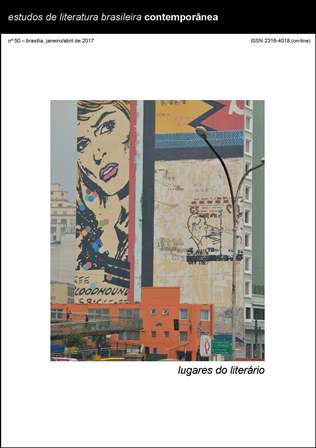Romances não criativos
DOI:
https://doi.org/10.1590/2316-40185010Abstract
Se consideramos a extensa bibliografia teórica sobre o romance, não é possível deixar de reconhecer a instabilidade de sua forma como traço característico do gênero. Assim, gostaria de aproveitar o mote e discutir mais atentamente a hipótese de que alguns exemplos contemporâneos dão uma nova volta ao parafuso e sugerem novas maneiras de fabricar e consumir narrativas hoje, apontando, mais uma vez, para a remodelação das fronteiras do gênero romanesco. Minha reflexão, então, tem como fundamento teórico a noção de “escrita não criativa” tal como elaborada por Kenneth Goldsmith (2011) para pensar a prática da apropriação de outros textos posta em operação por algumas narrativas da literatura contemporânea brasileira, tais como Opsanie Swiata, de Verônica Stigger, ou Sujeito oculto, de Cristiane Costa, acreditando que tais formas provocam um redimensionamento valorativo da noção de obra, de originalidade e do próprio conceito de literatura.
Downloads
References
BARTH, John (1984). The literature of exhaustion. In: BARTH, John. The friday book: essays and other non-fiction. London: The John Hopkins University Press.
COSTA, Cristiane (2014a). Sujeito oculto. Rio de Janeiro. Aeroplano.
COSTA, Cristiane (2014b). Em novo romance escritora usa plágio como recurso literário. Entrevista a Maurício Meirelles. O Globo, Rio de Janeiro, 27 nov. Disponível em: https://goo.gl/OZSJil. Acesso em: 4 out. 2015.
COSTA, Cristiane (2015). Curta! Com Cristiane Costa e Leonardo Villa-Forte. Vídeo. Disponível em: https://goo.gl/jrN2wT. Acesso em: 4 out. 2015.
DIAS, Ângela Maria (2015). A descrição do mundo de Verônica Stigger ou uma antropofagia desidratada. O Eixo e a Roda, Belo Horizonte, v. 24, n. 1, p. 61-76, jan./jul. Disponível em: https://goo.gl/3mZ2td. Acesso em: 9 set. 2016.
GOLDSMITH, Kenneth (2011). Uncreative writing. Managing language in the digital age. New York. Columbia University Press.
GOLDSMITH, Kenneth (2015). I look to theory only when I realize that somebody has dedicated their entire life to a question I have only fleetingly considered. The purposes of repurposing. Poetry!, Chicago, 1st Apr. Disponivel em: https://goo.gl/v5eEhm. Acesso em: 4 out. 2015.
KANT, Immanuel (1995). Crítica da faculdade do juízo. Tradução de Valerio Rohden e Antonio Marques. 2. ed. Rio de Janeiro: Forense Universitária.
LAUB, Michel (2009). O gato diz adeus. São Paulo: Companhia das Letras.
LERNER, Ben (2014). Each cornflake. London Review of Books, London, v. 36, n. 10, 22 maio. Disponível em: https://goo.gl/oY4WQX. Acesso em: 4 out. 2015.
LERNER, Ben (2015). Time is a flat circle: Ben Lerner interviewed. The Quietus, London, 8 fev. Entrevista a Karl Smith. On-line. Disponível em: https://goo.gl/aooP0B. Acesso em: 4 out. 2015.
LETHEM, Jonathan (2012). O êxtase da influência: um plágio. Tradução de Alexandre Barbosa de Souza e Bruno Costa. Serrote, São Paulo, v. 12, p.117-147, nov.
LÃSIAS, Ricardo (2012). Entrevista ao Paiol Literário. Jornal Rascunho, Curitiba, n. 145 On-line. Disponível em: http://rascunho.com.br/ricardo-lisias/. Acesso em: 9 dez. 2012.
MOURA, Carolina (2012). Veronica Stigger fala das origens e das apropriações de sua literatura. Notícias do Dia, Florianópolis, 2 dez. On-line. Disponível em: https://goo.gl/Dl3VHO. Acesso em: 4 out. 2015.
PAULS, Alan; HELFT, Nicolas (2000). El factor Borges. Nueve ensayos ilustrados. Buenos Aires: Fondo de Cultura Económica.
PERLOFF, Marjorie (2013). O gênio não original. Poesia por outros meios no novo século. Belo Horizonte: Editora da UFMG.
SCHWARTZ, Adriano (2009). Muito cálculo enfraquece boa estrutura. Folha de S. Paulo, caderno Ilustrada, 25 abr. Disponível em: https://goo.gl/pty5IF. Acesso em: 9 set. 2016.
SPERANZA, Graciela (2006). Fuera de campo. Literatura y arte argentinos después de Duchamp. Barcelona: Anagrama.
STIGGER, Veronica (2013). Opisanie Swiata. São Paulo: Cosac Naify.
SUSSEKIND, Flora (2013). Objetos verbais não identificados. O Globo, Rio de Janeiro, caderno Prosa e Verso, 21 set. Disponível em: <http://goo.gl/18j8Hf>. Acesso em: 22 out. 2013
Downloads
Published
How to Cite
Issue
Section
License
Authors who publish in this journal agree to the following terms:
a) The authors maintain the copyright and grant the journal the right of first publication, the work being simultaneously licensed under the Creative Commons Attribution License-Non Commercial 4.0 which allows the sharing of the work with acknowledgment of the authorship of the work and publication this journal.
b) Authors are authorized to enter into additional contracts separately, for non-exclusive distribution of the version of the work published in this journal (eg publish in institutional repository or as a book chapter), with authorship recognition and publication in this journal.
c) Authors are allowed and encouraged to publish and distribute their work online (eg in institutional repositories or on their personal page) after the editorial process, as this can generate productive changes, as well as increase the impact and citation of published work (See The Effect of Free Access).
d) The authors of the approved works authorize the magazine to, after publication, transfer its content for reproduction in content crawlers, virtual libraries and the like.
e) The authors assume that the texts submitted to the publication are of their original creation, being fully responsible for their content in the event of possible opposition by third parties.


